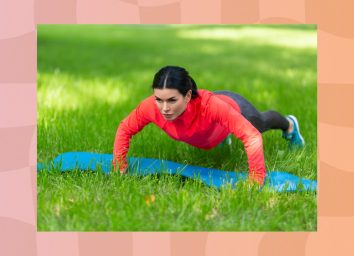The Best Time To Work Out for Maximum Fat Burn, Experts Say

Some swear by early-morning workouts, claiming they torch fat like a blowtorch on butter. Others insist that evening training is the real secret, helping them push harder and burn more calories overall. So, which is it? Is there an optimal time to work out if your goal is to maximize fat burn?
The short answer: It depends.
Your body's internal clock, known as your circadian rhythm, influences everything from hormone levels to metabolism and how efficiently you burn fat. The time of day you exercise can impact your workout intensity, calorie expenditure, and even how much fat your body prioritizes as fuel. But here's the good news—you can burn fat no matter when you work out. However, specific time slots may give you a slight edge depending on your goals and lifestyle.
To clear up the confusion, I dug into the science to break down exactly when you should hit the gym for peak fat-burning potential.
Morning vs. Evening Workouts: Which Burns More Fat?

Should you trade your snooze button for a morning sweat session, or is it better to crush a workout after a long day? Let's break down the science.
Morning Workouts: The Case for Early Fat Burning
Exercising in the morning—especially before eating—can ramp up fat oxidation. A study published in the British Journal of Nutrition found that people who performed fasted cardio (exercising before breakfast) burned up to 20% more fat during their workout than those who ate beforehand. This happens because, after an overnight fast, glycogen (your body's stored form of carbs) is lower, forcing your body to tap into fat stores for energy.
Morning workouts also increase excess post-exercise oxygen consumption (EPOC), often called the "afterburn effect," meaning your body continues burning calories at a higher rate for hours after you finish, keeping your metabolism elevated throughout the day.
However, there's a trade-off. Your body temperature and muscle function are lower in the morning, meaning strength and endurance might suffer. This is why early workouts feel harder, and your peak performance (for things like heavy lifting or sprints) might not be as high as later in the day.
Evening Workouts: The Case for Peak Performance
While morning workouts may have a slight edge in fat oxidation, evening workouts can help you push harder, leading to a more significant total calorie burn. Your body temperature naturally rises throughout the day, peaking in the late afternoon and early evening. A higher temperature means muscles are more pliable, reaction times are faster, and strength levels are at their highest.
One downside? Exercising too late, especially with high-intensity training, can interfere with sleep. Since deep, restful sleep is critical for fat loss and recovery, timing your evening workout at least a few hours before bed can help you avoid disruptions.
How Your Body Clock Affects Fat Burning

Your circadian rhythm—the internal clock that regulates sleep, hormone secretion, and energy metabolism—plays a significant role in how your body burns fat throughout the day.
- Morning Workouts & Fat Oxidation: In the early hours, cortisol (a hormone linked to fat metabolism) and adrenaline are naturally high, which can enhance fat burning. Since insulin levels are also lower, your body is more likely to use stored fat for energy than carbohydrates.
- Afternoon & Evening Workouts & Performance: As the day progresses, your body temperature, testosterone levels, and neuromuscular coordination improve, making later workouts feel easier and more effective. Studies show that training in the evening can lead to greater muscular adaptations, meaning you may build more lean muscle—which, in turn, boosts resting metabolism and fat burning.
So, while morning workouts might encourage immediate fat oxidation, evening workouts may have a longer-term impact by helping you build more muscle and burn more calories over time.
Does Fasted Cardio Really Burn More Fat?

Fasted cardio—exercising before eating—has gained a following among fitness enthusiasts. The idea is simple: When you exercise on an empty stomach, your body has no choice but to burn stored fat for fuel.
Research does show that fat oxidation is higher during fasted workouts. However, there's a catch: This increase in fat oxidation doesn't necessarily translate to more significant fat loss over time.
Why? Because total calorie expenditure matters more than when or how your body burns fat. While fasted cardio may help you use more fat during the workout, studies suggest that the difference in 24-hour fat burn is minimal compared to exercising in a fed state. Plus, training fasted can lead to reduced workout intensity, meaning you may not burn as many total calories.
So, if you love fasted cardio and it works for you, go for it. But if skipping breakfast before a workout leaves you feeling sluggish, you won't be missing out on fat loss by eating first.
The Best Workout Time for Your Goals

Ultimately, the best time to work out depends on what you want to achieve:
- For maximum fat burn: Morning workouts—especially in a fasted state—may have a slight edge due to increased fat oxidation.
- For peak performance & muscle gain: Late afternoon and evening workouts allow for better strength, endurance, and power output.
- For consistency and long-term results: The best time is the one that fits your schedule and lifestyle because adherence beats perfection every time.
At the end of the day (or first thing in the morning), fat loss comes down to total calorie burn, workout intensity, and consistency. The most important thing is to pick a time to train regularly and effectively.
(Now, if only we could find the perfect time to actually enjoy burpees… but science hasn't cracked that one yet.)
References
- Gonzalez, Javier T. et al. "Breakfast and Exercise Contingently Affect Postprandial Metabolism and Energy Balance in Physically Active Males." British Journal of Nutrition 110.4 (2013): 721–732. Web.
- LaForgia, J et al. "Effects of exercise intensity and duration on the excess post-exercise oxygen consumption." Journal of sports sciences vol. 24,12 (2006): 1247-64. doi:10.1080/02640410600552064
- Alkhaldi, Eid H et al. "Effect of Nighttime Exercise on Sleep Quality Among the General Population in Riyadh, Saudi Arabia: A Cross-Sectional Study." Cureus vol. 15,7 e41638. 10 Jul. 2023, doi:10.7759/cureus.41638
- Zouhal, Hassane et al. "Exercise Training and Fasting: Current Insights." Open access journal of sports medicine vol. 11 1-28. 21 Jan. 2020, doi:10.2147/OAJSM.S224919









